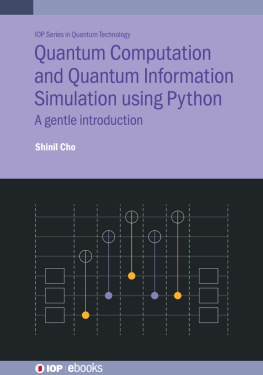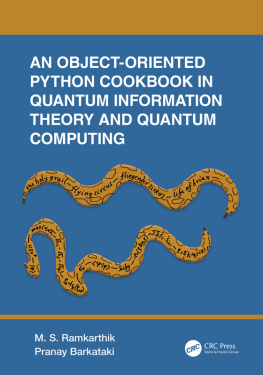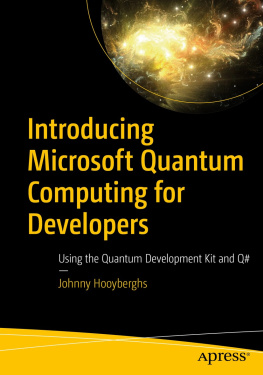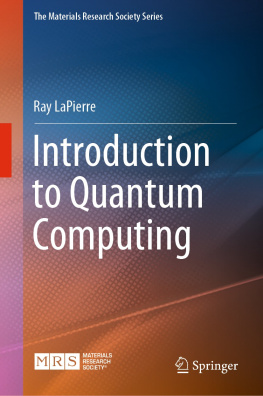Contents
Contents
Quantum Computation and Quantum Information Simulation using Python
A gentle introduction
Shinil Cho
Department of Physics, La Roche University, Pittsburgh, PA, USA
IOP Publishing, Bristol, UK
IOP Publishing Ltd 2022
All rights reserved. No part of this publication may be reproduced, stored in a retrieval system or transmitted in any form or by any means, electronic, mechanical, photocopying, recording or otherwise, without the prior permission of the publisher, or as expressly permitted by law or under terms agreed with the appropriate rights organization. Multiple copying is permitted in accordance with the terms of licences issued by the Copyright Licensing Agency, the Copyright Clearance Centre and other reproduction rights organizations.
Permission to make use of IOP Publishing content other than as set out above may be sought at .
Shinil Cho has asserted his right to be identified as the author of this work in accordance with sections 77 and 78 of the Copyright, Designs and Patents Act 1988.
ISBN 978-0-7503-3963-6 (ebook)
ISBN 978-0-7503-3961-2 (print)
ISBN 978-0-7503-3964-3 (myPrint)
ISBN 978-0-7503-3962-9 (mobi)
DOI 10.1088/978-0-7503-3963-6
Version: 20220701
IOP ebooks
British Library Cataloguing-in-Publication Data: A catalogue record for this book is available from the British Library.
Published by IOP Publishing, wholly owned by The Institute of Physics, London
IOP Publishing, Temple Circus, Temple Way, Bristol, BS1 6HG, UK
US Office: IOP Publishing, Inc., 190 North Independence Mall West, Suite 601, Philadelphia, PA 19106, USA
IOP Series in Quantum Technology
Series Editor: Barry Garraway (School of Mathematical and Physical Sciences, University of Sussex, UK)
About the series
The IOP Series in Quantum Technology is dedicated to bringing together the most up to date texts and reference books from across the emerging field of quantum science and its technological applications. Prepared by leading experts, the series is intended for graduate students and researchers either already working in or intending to enter the field. The series seeks (but is not restricted to) publications in the following topics:
- Quantum biology
- Quantum communication
- Quantum computation
- Quantum control
- Quantum cryptography
- Quantum engineering
- Quantum machine learning and intelligence
- Quantum materials
- Quantum metrology
- Quantum optics
- Quantum sensing
- Quantum simulation
- Quantum software, algorithms and code
- Quantum thermodynamics
- Hybrid quantum systems
A full list of titles published in this series can be found here: https://iopscience.iop.org/bookListInfo/iop-series-in-quantum-technology.
To My family, Mari, Felix, and Michael.
Preface
In 2000, the National Science Foundation predicted that Quantum Information science (QIS) will have an extensive eventual impact on how science is taught at the college and secondary level, and will bring a deeper understanding of quantum physics to a broad segment of the lay public. Now, everyone talks about quantum computers as the future of computational means. Although there are many journal articles, books, and research articles on quantum computation and information, they are often either too easy or too difficult for physics students. There are many excellent lecture notes, textbooks, and videos available from highly recognized universities worldwide, but they are intensive and may not be ideal to those who want to self-study the subject and explore the current status of the quantum computation and information theory.
This book aims for an easy-to-read, self-paced but practical introduction to serious learners by taking a step-by-step approach without the need of rigorous mathematics. It does not describe what you can do with quantum computers but instead describes what other books do not write out, especially such content that may not be obvious for those who just started learning quantum computation. Fundamental concepts of physics behind quantum gates and selected programming examples of simulated quantum computation are explained in detail without referring to many other books and articles. This book intends to serve as a gateway to acquire more advanced knowledge and even using existing cloud-based quantum computers. Readers should take pencil and paper to follow the steps in order to feel the spin dynamics through the quantum gates.
Chapter demonstrates how to send a code safely using photon quantum bits without being tampered with, called the BB84 protocol. The appendix briefly introduces the latest commercial advancements developed by Amazon, IBM, Microsoft, Google, and D-wave, and other companies.
You will be amazed to learn how much this cutting-edge technology has progressed once you immerse yourself into the subject. Let us dive into a practical gateway from this book.
Author biography
Shinil Cho
Shinil Cho attended Rikkyo University (St. Paul University) in Tokyo, Japan for his BS degree, Seoul National University in Seoul, Korea for MS, and the Ohio State University for PhD. He held post-doctoral fellowships at the Ohio State University and University of Florida, a visiting professor at University of South Carolina. He has been at La Roche University since 1995. Currently he is a full Professor at La Roche.
He has conducted research in critical phenomena of random systems, cryogenic magnetic resonance spectroscopy below 1 Kelvin, and biometric fingerprint authentication. His current research interest includes Monte Carlo analysis of random systems, quantum computation, biometrics, and physics education. Other than physics, he has many publications and presentations on biometrics in London, Gothenburg, Tokyo, Seoul, Hong Kong, Singapore, and several cities in the United States.
Acknowledgments
The author would like to thank Dr John Navas, the editor, at IOP Publishing for encouraging me with an opportunity to write this book, and Ms Phoebe Hooper and her staff for brushing up the text and careful proofreading. Without their help, this book would not be published.
IOP Publishing
Quantum Computation and Quantum Information Simulation using Python
A gentle introduction
Shinil Cho
Chapter 1
Two-level quantum systems
We need a basic knowledge of linear algebra (vectors and matrices) throughout this book. Because readers of this book may be unfamiliar with vectors and matrices, in the first half of this chapter we will briefly describe them. In the second half, rotations of spins and the coordinates, projection operators to represent observations, and entanglement and superposition of quantum states will be discussed. Mathematics of photon-based qbit is also given.
1.1 Vectors and matrices
1.1.1 Calculation rules of vectors and matrices
Two-dimensional vector
In this book, we use Diracs vector notation used in quantum physics. Consider an arbitrary two-dimensional vector 









